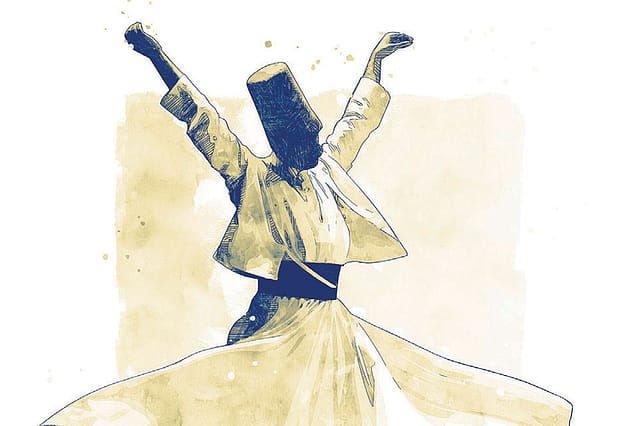Longing in Lahore

SARBPREET SINGH’S NOVEL The Sufi’s Nightingale is an exquisite work of historical fiction set in 16th-century Lahore. It revolves around the intense relationship between a Malamati Sufi called Shah Hussain from Bazaar-e-Husn, and a Brahmin boy named Madho from Shahdara.
The former is a clean-shaven ghungroo-wearing faqir with a band of followers who—like him—wear red robes, sing of the divine, dance, and drink regularly at a tavern. They do not want to be seen as pious. They court and embrace rejection, insults and abuse because their goal is to conquer the self-aggrandising ego that comes in the way of their spiritual practice.
The latter is a handsome lad who lives with his parents, wears the sacred thread on his bare torso, and dhotis made of silk, accompanied by leather slippers decorated with red and gold brocade. Shah Hussain’s mureeds (disciples) want nothing other than the honour of cooking for him, massaging his feet, and washing his clothes, but the scholar-turned-dervish has eyes only for the boy who shows up at the doorstep of Amba—the most renowned courtesan in the city.
Their story is unusual because Shah Hussain is a few decades older than Madho. This does not stop him from pining for and pursuing the tall, curly-haired, broad-shouldered youth. Those who lack the ability to see beyond the superficial assume that he is looking for sex, but the truth is that he has found the perfect student to pass on his knowledge to. “The awakening of divine love in the soul of a Sufi is a mysterious thing and is often difficult for the world to understand,” says Shah Hussain, comparing his love for Madho to Rumi’s love for Shams Tabrizi, and Heer’s love for Ranjha. Madho is grateful to be a spiritual apprentice to this generous and accomplished teacher, but he cannot bear the taunts of his childhood friends who allege that he is a mere catamite. His masculinity feels threatened.
AIming High
20 Feb 2026 - Vol 04 | Issue 59
India joins the Artificial Intelligence revolution with gusto
How does Madho wrestle with this dilemma? What does Shah Hussain have to say in response? Why is it important for people to distinguish between spiritual love and carnal desire? Read Singh’s book to discover for yourself. The story is skilfully unravelled through chapters in the voices of multiple narrators, and interspersed with translations of Shah Hussain’s poems from Punjabi into English, and letters written by Shah Hussain and Madho. The nightingale referred to in the novel’s title is Maqbool aka Maqboola, a mureed who turns each of the poems into a raga-based musical composition and sings them like no one else can.
People who are unable to make a trip to Pakistan to visit the shrine in Baghbanpura, where Shah Hussain and Madho lie buried beside each other, would feel a deep sense of connection with them even by simply reading Singh’s fictional account that is worthy of the highest praise. He offers a convincing portrait of what it feels like to be feverish with longing, tormented by separation, and overcome with jealousy. He also shows how peaceful it is to come home to where one truly belongs, where one is understood and fully welcomed.
This novel has several other characters—Madho’s parents, Shaikh Behlol Daryayi, Ayub Khan, Hatem, Mai Lado, Jamal Khan, Sura, Maulana Sayyidullah, Abdul Nabi Sultanpuri and Badshah Akbar. By highlighting their qualities and back stories, Singh ensures that they make an impression with their small but significant roles.
This well-researched and magnificently crafted book would appeal to a variety of readers— connoisseurs of historical fiction, peace activists, those who conduct interfaith dialogue, diasporic Punjabis who are keen to reconnect with their language and culture, Indians who mourn the shared subcontinental heritage that got partitioned in 1947; also Pakistanis who feel nostalgic about the Basant celebrations of yore and worry about the frequent attacks on Sufi shrines. Additionally, it would also strike a chord with young South Asian queer folks looking for pre-colonial and non- Western queer narratives and icons to affirm their existence.

